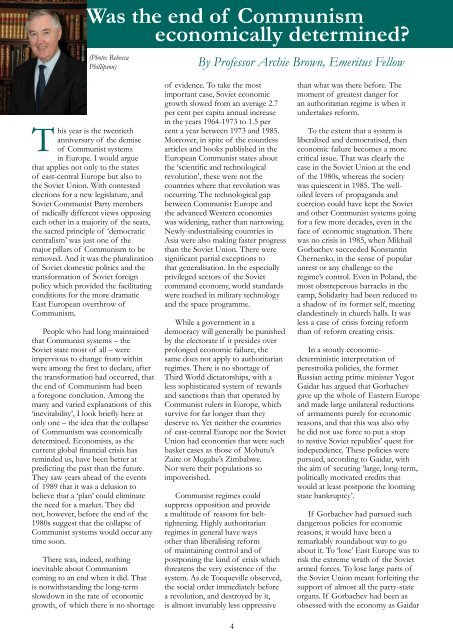You also want an ePaper? Increase the reach of your titles
YUMPU automatically turns print PDFs into web optimized ePapers that Google loves.
Was the end of Communism<br />
economically determined?<br />
(Photo: Rebecca<br />
Phillipson)<br />
By Professor Archie Brown, Emeritus Fellow<br />
This year is the twentieth<br />
anniversary of the demise<br />
of Communist systems<br />
in Europe. I would argue<br />
that applies not only to the states<br />
of east-central Europe but also to<br />
the Soviet Union. With contested<br />
elections for a new legislature, and<br />
Soviet Communist Party members<br />
of radically different views opposing<br />
each other in a majority of the seats,<br />
the sacred principle of ‘democratic<br />
centralism’ was just one of the<br />
major pillars of Communism to be<br />
removed. And it was the pluralization<br />
of Soviet domestic politics and the<br />
transformation of Soviet foreign<br />
policy which provided the facilitating<br />
conditions for the more dramatic<br />
East European overthrow of<br />
Communism.<br />
People who had long maintained<br />
that Communist systems – the<br />
Soviet state most of all – were<br />
impervious to change from within<br />
were among the first to declare, after<br />
the transformation had occurred, that<br />
the end of Communism had been<br />
a foregone conclusion. Among the<br />
many and varied explanations of this<br />
‘inevitability’, I look briefly here at<br />
only one – the idea that the collapse<br />
of Communism was economically<br />
determined. Economists, as the<br />
current global financial crisis has<br />
reminded us, have been better at<br />
predicting the past than the future.<br />
They saw years ahead of the events<br />
of 1989 that it was a delusion to<br />
believe that a ‘plan’ could eliminate<br />
the need for a market. They did<br />
not, however, before the end of the<br />
1980s suggest that the collapse of<br />
Communist systems would occur any<br />
time soon.<br />
There was, indeed, nothing<br />
inevitable about Communism<br />
coming to an end when it did. That<br />
is notwithstanding the long-term<br />
slowdown in the rate of economic<br />
growth, of which there is no shortage<br />
of evidence. To take the most<br />
important case, Soviet economic<br />
growth slowed from an average 2.7<br />
per cent per capita annual increase<br />
in the years 1964-1973 to 1.5 per<br />
cent a year between 1973 and 1985.<br />
Moreover, in spite of the countless<br />
articles and books published in the<br />
European Communist states about<br />
the ‘scientific and technological<br />
revolution’, these were not the<br />
countries where that revolution was<br />
occurring. The technological gap<br />
between Communist Europe and<br />
the advanced Western economies<br />
was widening, rather than narrowing.<br />
Newly-industrialising countries in<br />
Asia were also making faster progress<br />
than the Soviet Union. There were<br />
significant partial exceptions to<br />
that generalisation. In the especially<br />
privileged sectors of the Soviet<br />
command economy, world standards<br />
were reached in military technology<br />
and the space programme.<br />
While a government in a<br />
democracy will generally be punished<br />
by the electorate if it presides over<br />
prolonged economic failure, the<br />
same does not apply to authoritarian<br />
regimes. There is no shortage of<br />
Third World dictatorships, with a<br />
less sophisticated system of rewards<br />
and sanctions than that operated by<br />
Communist rulers in Europe, which<br />
survive for far longer than they<br />
deserve to. Yet neither the countries<br />
of east-central Europe nor the Soviet<br />
Union had economies that were such<br />
basket cases as those of Mobutu’s<br />
Zaire or Mugabe’s Zimbabwe.<br />
Nor were their populations so<br />
impoverished.<br />
Communist regimes could<br />
suppress opposition and provide<br />
a multitude of reasons for belttightening.<br />
Highly authoritarian<br />
regimes in general have ways<br />
other than liberalising reform<br />
of maintaining control and of<br />
postponing the kind of crisis which<br />
threatens the very existence of the<br />
system. As de Tocqueville observed,<br />
the social order immediately before<br />
a revolution, and destroyed by it,<br />
is almost invariably less oppressive<br />
<br />
than what was there before. The<br />
moment of greatest danger for<br />
an authoritarian regime is when it<br />
undertakes reform.<br />
To the extent that a system is<br />
liberalised and democratised, then<br />
economic failure becomes a more<br />
critical issue. That was clearly the<br />
case in the Soviet Union at the end<br />
of the 1980s, whereas the society<br />
was quiescent in 1985. The welloiled<br />
levers of propaganda and<br />
coercion could have kept the Soviet<br />
and other Communist systems going<br />
for a few more decades, even in the<br />
face of economic stagnation. There<br />
was no crisis in 1985, when Mikhail<br />
Gorbachev succeeded Konstantin<br />
Chernenko, in the sense of popular<br />
unrest or any challenge to the<br />
regime’s control. Even in Poland, the<br />
most obstreperous barracks in the<br />
camp, Solidarity had been reduced to<br />
a shadow of its former self, meeting<br />
clandestinely in church halls. It was<br />
less a case of crisis forcing reform<br />
than of reform creating crisis.<br />
In a stoutly economicdeterministic<br />
interpretation of<br />
perestroika policies, the former<br />
Russian acting prime minister Yegor<br />
Gaidar has argued that Gorbachev<br />
gave up the whole of Eastern Europe<br />
and made large unilateral reductions<br />
of armaments purely for economic<br />
reasons, and that this was also why<br />
he did not use force to put a stop<br />
to restive Soviet republics’ quest for<br />
independence. These policies were<br />
pursued, according to Gaidar, with<br />
the aim of securing ‘large, long-term,<br />
politically motivated credits that<br />
would at least postpone the looming<br />
state bankruptcy’.<br />
If Gorbachev had pursued such<br />
dangerous policies for economic<br />
reasons, it would have been a<br />
remarkably roundabout way to go<br />
about it. To ‘lose’ East Europe was to<br />
risk the extreme wrath of the Soviet<br />
armed forces. To lose large parts of<br />
the Soviet Union meant forfeiting the<br />
support of almost all the party-state<br />
organs. If Gorbachev had been as<br />
obsessed with the economy as Gaidar

















